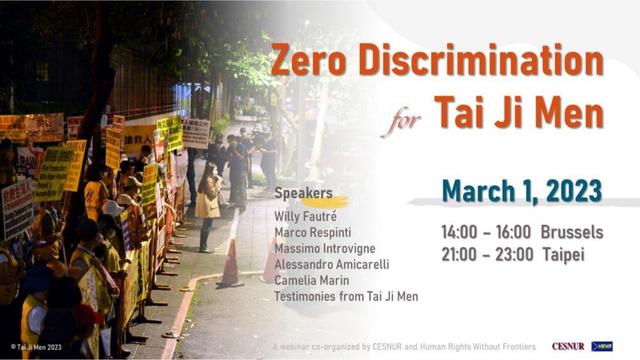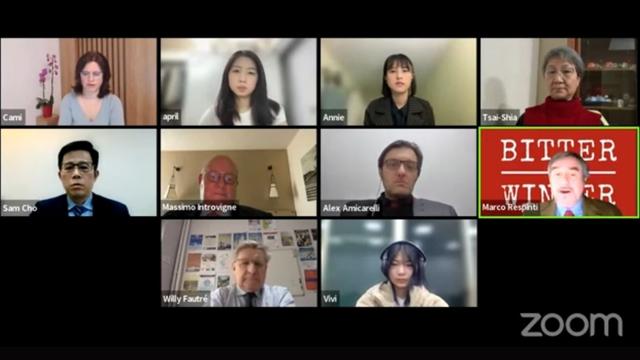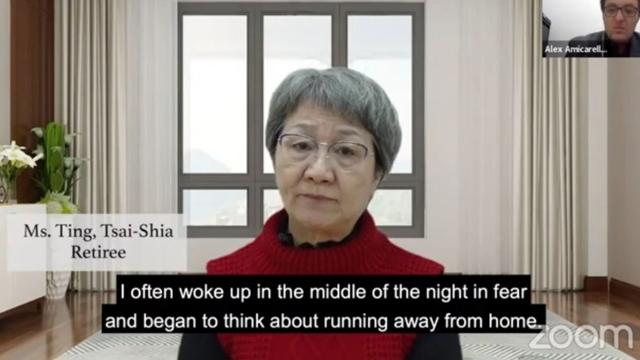On Zero Discrimination Day, scholars, human rights activists, and Tai Ji Men dizi discussed discrimination problems in Taiwan and internationally.
by Daniela Bovolenta

On March 1, 2023, United Nations Zero Discrimination Day, CESNUR and the Brussels-based NGO Human Rights Without Frontiers organized one of their bi-monthly webinars, with the title “Zero Discrimination for Tai Ji Men.”
Willy Fautré, co-founder and director of Human Rights Without Frontiers, mentioned the international treaties calling for the elimination of all discriminations. These treaties, he said, unfortunately did not prevent discriminations to continue, even in democratic countries, particularly in the field of freedom of religion or belief (FoRB). In several European countries, minority groups and the more so those stigmatized as “cults,” are discriminated from the legal and tax points of view. The same, Fautré noted, has happened in Taiwan with Tai Ji Men.
Fautré then presented a video introducing the Tai Ji Men case through an evocative song, and the first two speakers: Marco Respinti, an Italian scholar and journalist who serves as director-in-charge of Bitter Winter, and Massimo Introvigne, an Italian sociologist and the managing director of CESNUR who is the editor-in-chief of the same Bitter Winter.
Respinti noted that the essence of “Zero Discrimination” is human nature. Human beings have the right not to be discriminated because they are human, irrespective of their race, nationality, or religion. Even those who harass or persecute others, he said, have a right not to be discriminated as human beings—while there is no right of harassing and persecuting ,and these behaviors should rightfully being discriminated. Tai Ji Men and its Shifu (Grand Master), Dr. Hong Tao-Tze, Respinti said, fought for justice for more than 26 years but at the same time continues to teach and practice admirably the universal ideal of non-discrimination.

Introvigne reminded the audience that Zero Discrimination Day was introduced as a United Nations day of observance thanks to the efforts of the LGBT community. The right of the homosexual persons not to be discriminated or, worse, beaten and killed should be affirmed, he said, at a time when they are victims of horrible violence in Russia and Iran. At the same time, Introvigne noted, we should recognize that LGBT rights have been defended much more effectively internationally than FoRB. He gave the example of the fake accusations of spreading COVID-19 in Korea against a new religious movement, Shincheonji, and the gay community of Seoul. Both accusations were false but LGBT activists internationally were able to mobilize media and governments in a few days and the Korean government had to back off. In the case of Shincheonji, scholars of new religions mobilized and achieved some results, but they obtained much less than LGBT advocates, and Shincheonji continued to be unjustly vilified. Here, Introvigne said, lies a lesson for the Tai Ji Men case. Too often FoRB is regarded by international media as the Cinderella of human rights. In Taiwan and everywhere, religious liberty should be made again into the princess she deserves to be.
Alessandro Amicarelli, a London-based human rights attorney and the president of the European Federation for Freedom of Belief, introduced the second session by mentioning discriminations against groups labeled as “cults” that raise their ugly head again in France and Japan, in a significant parallel with the Tai Ji Men case. He then presented a video with the speech of Hugues Sanon at the breakout session of the recent third International Religious Freedom Summit in Washington DC devoted to “Collaborative Action Against Judicial and Tax Persecution by State Power: The Tai Ji Men Case.”
The full video of the event.
Sanon, a Haiti-born Christian minister and Special Envoy of International Relations to the United Nations for the NGO Council of Justice, Equality and Peace, noted that some states, including some that can be called democratic, still discriminate against religious or spiritual groups they do not like.
Sanon noted that this is against the Universal Declaration of Human Rights and other international covenants. The Tai Ji Men case, which is not solved after more than 26 years, he said, is an egregious example of these unjust and illegal discriminations. He publicly offered his solidarity to the Shifu and dizi of Tai Ji Men.

Amicarelli then introduced the testimonies of five Tai Ji Men dizi (disciples). Ting Tsai-Shia, who is retired, recalled how she was herself discriminated after the media slander campaign against Tai Ji Men started in 1996. Both her father and her mother-in-law harassed her, and tried to induce her to leave Tai Ji Men and even burn her dizi uniform. Only after several years they understood their mistakes and apologized. However, the corrupted bureaucrats who created the discrimination in the first place never apologized for their injustice and violations of the law, she said.
Annie Lu, a legal practitioner, told the story of one of her clients, who received a tax bills for online sales she performed fifteen years previously, including interests. She was not able to pay, was prevented from having a bank account, and as a registered “tax evader” had problems getting a job. Dr. Hong, Lu said, taught her how to transform her anger into a determination to publicly testify for tax justice and advocate for tax reform. She uses the Tai Ji Men case, when talking to other Taiwanese, as an example of the systemic tax injustice prevailing in Taiwan.

Vivi Lee, a sophomore at National Taiwan Normal University (NTNU), reported how she came across discrimination when a classmate she tried to befriend was bullied in school. Later she broadened her attention to discrimination in various fields. She went with Dr. Hong to India, where she noted the still existing discrimination of the very poor by the very rich, and in Turkey, where as we all now understand after the earthquake, corrupt bureaucrats allowed the construction of houses that were not seismically safe. Corruption, she said, is also at work in the Tai Ji Men case, and evidences systemic problems of discrimination in Taiwan.
Sam Cho, the project manager of a technology company, reported how, after his sister had joined Tai Ji Men in the US, he looked for information about Tai Ji Men on the Internet and found a lot of slander and fake news, an example of discrimination in itself. Happily, he said, he joined anyway, and continued to reflect on discrimination. He concluded that in the Tai Ji Men case there were two kinds of discrimination at work: “discrimination at the time of the crime” through the lies spread by Prosecutor Hou Kuan-Jen since he started the case in 1996, and “fabricated discrimination,” which tried to destroy Tai Ji Men through a false interpretation of the tax law that was not used for other martial arts and qigong groups, which was inherently discriminatory.
April Liu, who works at a digital media agency, reported how she learned from Dr. Hong that mutual respect is the hearth of non-discrimination. She understands how difficult is to find a genuine master, as emphasized by old Chinese stories, and feels privileged she has encountered Dr. Hong. She also recalled her participation in October 16, 2022, in the Global Prayer Ceremony for Love and Peace in Taipei. She was part of four performances: the Peacock Dance, Feather Fan Dance, Angel Dance, and Sword Dance. The Peacock Dance embodies the spirit of “ingesting all kinds of poisons and emitting fragrance,” she said, reminding us to not get angry in life and turn hostility into good energy. The Feather Fan Dance originated at the Chinese imperial court and is said to bring peace and blessings to the world. The Angel Dance symbolizes a messenger from heaven, spreading love and warmth to the earth. The Sword Dance encourages us to be brave and steadfast in upholding justice and speaking out against wrongdoing. This is what she does, she said, when she protests against the injustice vested on Tai Ji Men.

Camelia Marin, deputy director of the Danish human rights organization Soteria International, offered the conclusions of the webinar, recalling how states defame, stigmatize, and discriminate against certain religious and spiritual movements in an orchestrated way in several countries, both non-democratic and democratic. However when spiritual minorities are discriminated as it happens with Tai Ji Men in Taiwan, Marin said, we should ask the question whether the level of democracy in countries that call themselves democratic is really up to the United Nations and other international standards.
The event concluded with a video featuring the trademark Tai Ji Men song “A Prayer for Peace,” reminding all that love and peace offer the best protection against discrimination.
Source: Bitter Winter

